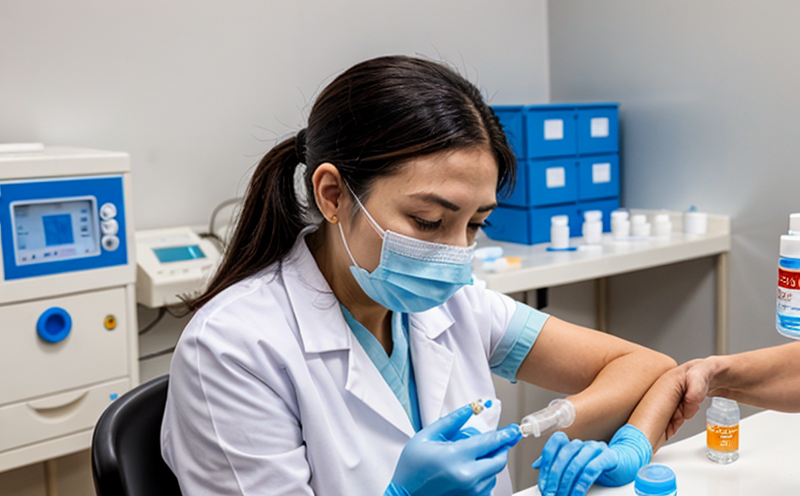ASTM F2338 Container Closure Leak Detection Testing
The ASTM F2338 standard provides a rigorous methodology for detecting leaks in containers used to package vaccines. This testing is critical in pharmaceutical manufacturing, ensuring product integrity and safety. Vaccine containers must be leak-free as even the slightest breach can lead to compromised vaccine potency or contamination.
The ASTM F2338 test involves pressurizing the container with a gas (typically nitrogen) while it is sealed, followed by a pressure decay measurement over time. Any significant drop in pressure indicates a leak. This process ensures that containers meet strict quality assurance standards set forth by regulatory bodies such as the World Health Organization (WHO), Food and Drug Administration (FDA), and European Medicines Agency (EMA).
The ASTM F2338 test is particularly important for vaccines, which are highly sensitive to environmental factors. Even trace amounts of moisture or contaminants can degrade vaccine efficacy. By using this standardized testing procedure, pharmaceutical companies ensure that their products meet global standards and maintain the highest level of quality.
Our laboratory utilizes state-of-the-art equipment to perform ASTM F2338 testing. Our team of experts has extensive experience in vaccine manufacturing and understands the critical nature of this test. We provide comprehensive reports detailing every step of the process, including pressure readings, decay rates, and any potential leaks detected.
In addition to ASTM F2338, we also perform other related tests such as seal integrity testing (ASTM E427), which complements the leak detection process by ensuring that seals are intact. These additional tests provide a more comprehensive understanding of container integrity.
| Standard | Description | Relevance to Vaccine Testing |
|---|---|---|
| ASTM F2338-19 | Test method for determining leak tightness of closures on containers. | Ensures vaccine container integrity and prevents product contamination or degradation. |
| ASTM E427-06(2015) | Determination of seal integrity in rubber-sealed metal closures by pressure testing. | Provides additional assurance that seals are intact, preventing leaks from occurring during storage and transport. |
The ASTM F2338 test is not only important for vaccine containers but also applicable to other pharmaceutical products. The methodology ensures that all sealed containers meet the highest quality standards, protecting the integrity of the product throughout its lifecycle.
Our laboratory adheres strictly to these standards and uses advanced instrumentation to ensure accurate results. This commitment to precision and accuracy is reflected in our comprehensive reporting process, which includes detailed documentation of every test conducted. Our clients can be assured that their products meet the highest quality standards and are safe for use.
Why It Matters
The integrity of pharmaceutical containers, particularly those used to package vaccines, cannot be overstated. A single breach in a vaccine container can lead to significant issues, including reduced vaccine efficacy or contamination, both of which could have serious public health implications.
Vaccines are highly sensitive products that must remain stable and effective until they reach the intended recipient. Any compromise in their integrity during manufacturing or storage can result in wasted resources and potential harm to patients. Therefore, ensuring that containers meet strict leak detection standards is paramount.
The ASTM F2338 test provides a reliable method for identifying leaks early in the production process, allowing manufacturers to address any issues before the product reaches the market. This proactive approach not only enhances product quality but also protects public health by ensuring that vaccines remain safe and effective throughout their lifecycle.
In addition to protecting public health, adhering to these standards also helps pharmaceutical companies meet regulatory requirements. Regulatory bodies such as the WHO, FDA, and EMA have stringent guidelines for vaccine manufacturing and distribution. Compliance with these regulations ensures that products are not only of high quality but also safe for use in diverse global markets.
By investing in rigorous testing protocols like ASTM F2338, pharmaceutical companies can build trust with consumers and regulatory authorities alike. This trust is essential for maintaining a reputable brand image and ensuring long-term success in the highly competitive vaccine market.
Applied Standards
| Standard | Description |
|---|---|
| ASTM F2338-19 | Test method for determining leak tightness of closures on containers. |
| ASTM E427-06(2015) | Determination of seal integrity in rubber-sealed metal closures by pressure testing. |
| ISO 11379:2004 | Pressure tightness test for containers used with pharmaceutical products. |
| EN ISO 5835-1:2016 | Sterilization of medical devices – Packaging and labeling requirements. |
The combination of these standards ensures that all aspects of container integrity are thoroughly evaluated, providing a comprehensive approach to quality assurance in vaccine packaging. This multi-faceted testing strategy helps pharmaceutical companies meet global regulatory requirements while also enhancing product safety and efficacy.
Environmental and Sustainability Contributions
The ASTM F2338 test plays an important role in environmental sustainability by ensuring that vaccine containers are leak-free. This reduces the risk of product wastage due to leaks, which can occur during storage or transport. By minimizing waste, pharmaceutical companies contribute positively to environmental conservation efforts.
Additionally, adhering to these standards helps reduce the carbon footprint associated with manufacturing and distributing vaccines. Efficient packaging that maintains product integrity ensures that vaccines remain effective throughout their lifecycle, reducing the need for re-manufacturing or replacement due to compromised products.
The ASTM F2338 test also supports sustainable practices by ensuring that pharmaceutical companies can meet regulatory requirements without compromising on quality. This aligns with broader sustainability goals and helps build a more responsible industry.





